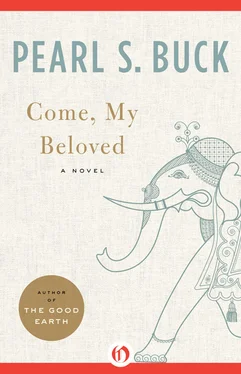“Why not burn the body?” David asked in a low voice.
The priest looked shocked. “Fire is pure,” he declared. “It must not be polluted by the bodies of the dead. Water is also pure, and neither should the earth be polluted for it is the source of food and strength.”
As though this could not be contradicted, he did not speak while he led them along the path through the beautiful and utterly silent grounds where not a bird sang or any sound penetrated from the city below. There were five towers, and into one of them the priest led them, and then he spoke again.
“It is not usual to come into one of the towers, but you are guests of the Governor-General and I will go beyond what is usual.”
The tower was roofless, the walls about forty feet high, spotlessly clean with whitewash. The gate to this tower was high and they had to climb steps to reach it. At the gate they stood, for the priest forbade them to enter. “You can see what it is,” he said. “You need not to enter, if you please.”
What they saw was a series of paths, running like the spokes of a wheel to a depressed pit at the bottom. Between the paths were rows of small compartments for the dead.
“For the men, the women, the children,” the priest explained.
“There are most for the children and then for the women,” David said.
“Most children must die,” the priest said calmly, “and more women than men, as is their fate.”
They gazed about the place, and as though their presence were a portent, vultures rose from the trees and, moving their heavy wings, they flew slowly over the tower.
“Into these compartments the dead are placed,” the priest intoned. “First, they are taken into the anteroom and the vestments and coverings are taken away, these are purified and returned to the family. Then the corpse, naked as it was born, is laid into its roofless cell and the bearers withdraw. It is now that the vultures do their sacred work. They descend and strip away the flesh, and the bones are left clean. No human comes near. Then the elements do their work. The sun shines down and bleaches the bones and the rain falls and washes them clean until they are pure and white. When the cell is needed for yet another of the dead, the attendant priests, the Nasr Salars, enter with gloves and tongs and take up the bones and cast them into the central pit, where they turn to dust. All the water that falls into this tower and into each of the other towers is gathered by drains and runs down into the pit, which is perforated so that the water carries away the dust of the dead. Below are charcoal filters through which the water must pass and then it flows into a great conduit and so to the bay and from thence to the eternal sea.”
“Does the pit never fill?” David asked in a voice infused with horror.
“Never,” the priest replied. “In hundreds of years it has never filled. The elements do their work well.”
MacArd was stricken in silence, troubled and moved at the same time, revolted and impressed. The priest continued to speak in the same reverent voice.
“It is our faith that before God all men are equal, and here there is no difference between the rich and the poor. All the cells are alike and all the dead alike are given over to the sun and the rain and the sea. All alike find the same rest.”
“But to have no grave from which to arise!” David exclaimed.
“Nevertheless we do believe in the resurrection of the dead,” the priest declared. “It is our faith that our bodies will rise again from the elements, glorified by a new life which as yet we cannot comprehend.”
For MacArd the scene changed, the honor disappeared, and he grasped at the immortal faith. “You believe that, too!” he exclaimed.
“All those who are truly religious believe in the eternity of the soul,” the priest replied.
“That’s very important,” MacArd cried.
David was surprised at the sudden excitement in his voice and still more surprised when at the gate MacArd put into the priest’s hand a roll of rupees.
“It’s been interesting,” MacArd said. “It’s been very interesting. I’ll never forget this.”
The compartment on the train to Poona was large and Wahdi had provided comforts. He had rented bedding from the hotel and had filled a high wicker basket with tinned foods, enough for a journey many times longer than the one to Poona. The windows were closed against the dust, but ventilators were open in the ceilings and dust drifted in as fine and dry as powder. David lay on a couch of quilts spread upon one of the wide benches, sleeping. He wore only his underdrawers, but the smooth skin of his youthful body was damp with sweat.
MacArd glanced at him now and again, recognizing in his son with love and pain the grace of Leila, his mother. His own heavy frame had none of this shapely slenderness, this delicacy of ankle and wrist. Yet David was not feminine. His shoulders were broad and his hips were narrow, and his height MacArd himself had bestowed. But the boy’s face was not at all his, and the dark coloring was contrast enough when they were seen together, so that strangers remarked upon it. He was glad that David could sleep for there was little enough to see from the dusty windows, plains as barren as winter, though it was already so hot that one could scarcely endure the windy heat. Upon the plains the earthen villages were pitilessly bare under the blazing sun. The villages were scarcely more clear upon the landscape than molehills heaped up, and out of them crawled the most dreary creatures he could imagine upon the earth. Yet they were human, though they seemed scarcely different from the pitiful skeleton shapes of the cattle which roamed restlessly over the barren ground, searching for food that did not exist. Men and women and cattle alike were waiting for the rains, still months away. A few days of rain, Wahdi explained, and these dry barrens would spring into instant green. The seed was there, waiting for the life-giving water.
“There is always life,” Wahdi declared.
MacArd recalled the words now as he sat staring out of the window. Wahdi was a Muslim and so the Muslims must believe in it, too. It was a queer thing if he, a Christian, as he supposed he was, should find in a heathen country the faith to believe that Leila still lived. Yet these were very ancient people and they had been religious for a long time and maybe they knew more about such things than fellows like Barton did. He ruminated awhile, and feelings of warm pity stirred about his heart. It was too bad that people so religious, so good, should live half-starved, their land as bare as a desert under a summer sun and all for the want of water and railroads and trade, which was what had made Americans comfortable and rich.
He slapped a fly from his cheek. In spite of the spraying that Wahdi had performed before they left Bombay, there were flies inside the closed car. Flies crawled through the solid wood, he was ready to swear. They were starving, too, and ravenous, teasing any object in repose, if this racking shaking travel could leave anything in repose. The railroads were a disgrace. Something ought to be done about India. The people had no chance. The English were a curious lot, so proud when there wasn’t much to be proud about. A few Americans now, young fellows, trained to develop the people themselves, could accomplish a lot in a few years. Only how would they get in here? The only Americans were a few missionaries. Well, maybe missionaries—
He forgot the flies and the dust and fell into one of those intense reveries which Leila used to call his darkness before dawn, his precreative mood. He was feeling about for the big idea. It would not come down out of the sky or alone. It grew as a twister grows out of a tornado, drawing winds and earth into its shape until it rises to the force of explosion. Then perfectly clearly he saw his big idea.
Читать дальше












